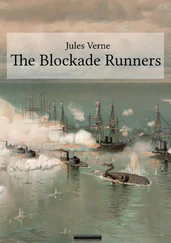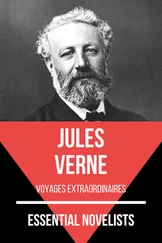“You are right, Mr. Clawbonny,” answered Bell.
“Go on! go on!” said Hatteras.
Bell obeyed tremblingly; for who knew how many human bodies the mound contained?
“These men have been the victims of the same accident that almost happened to us,” said the doctor. “Their snow-house tumbled in. Let us see if any one of them is still alive.”
The place was soon cleared, and Bell dug out a third body, that of a man of forty, who had not the cadaverous look of the others. The doctor examined him and thought he recognised some symptoms of existence.
“He is alive!” he cried.
Bell and he carried the body into the snow-house whilst Hatteras, unmoved, contemplated their late habitation. The doctor stripped the resuscitated man and found no trace of a wound on him. He and Bell rubbed him vigorously with oakum steeped in spirits of wine, and they saw signs of returning consciousness; but the unfortunate man was in a state of complete prostration, and could not speak a word. His tongue stuck to his palate as if frozen. The doctor searched his pockets, but they were empty. He left Bell to continue the friction, and rejoined Hatteras. The captain had been down into the depths of the snow-house, and had searched about carefully. He came up holding a half-burnt fragment of a letter. These words were on it:
… tamont … orpoise … w York.
“Altamont!” cried the doctor, of the ship Porpoise , of New York.”
“An American,” said Hatteras.
“I’ll save him,” said the doctor, “and then we shall know all about it.”
He went back to Altamont whilst Hatteras remained pensive. Thanks to his attentions, the doctor succeeded in recalling the unfortunate man to life, but not to feeling; he neither saw, heard, nor spoke, but he lived. The next day Hatteras said to the doctor:
“We must start at once.”
“Yes. The sledge is not loaded; we’ll put the poor fellow on it and take him to the brig.”
“Very well; but we must bury these bodies first.”
The two unknown sailors were placed under the ruins of the snow-house again, and Simpson’s corpse took Altamont’s place. The three travellers buried their companion, and at seven o’clock in the morning they set out again. Two of the Greenland dogs were dead, and Dick offered himself in their place. He pulled with energy.
During the next twenty days the travellers experienced the same incidents as before. But as it was in the month of February they did not meet with the same difficulty from the ice. It was horribly cold, but there was not much wind. The sun reappeared for the first time on the 31st of January, and every day he stopped longer above the horizon. Bell and the doctor were almost blinded and half-lame; the carpenter was obliged to walk upon crutches. Altamont still lived, but he was in a state of complete insensibility. The doctor took great care of him, although he wanted attention himself; he was getting ill with fatigue. Hatteras thought of nothing but his ship. What state should he find it in?
On the 24th of February he stopped all of a sudden. A red light appeared about 300 paces in front, and a column of black smoke went up to the sky.
“Look at that smoke! my ship is burning,” said he with a beating heart.
“We are three miles off yet,” said Bell; “it can’t be the Forward .”
“Yes it is,” said the doctor; “the mirage makes it seem nearer.”
The three men, leaving the sledge to the care of Dick, ran on, and in an hour’s time were in sight of the ship. She was burning in the midst of the ice, which melted around her. A hundred steps farther a man met them, wringing his hands before the Forward in flames. It was Johnson. Hatteras ran to him.
“My ship! My ship!” cried he.
“Is that you, captain? Oh, don’t come any nearer,” said Johnson.
“What is it?” said Hatteras.
“The wretches left forty-eight hours ago, after setting fire to the ship.”
“Curse them!” cried Hatteras.
A loud explosion was then heard; the ground trembled; the icebergs fell upon the icefield; a column of smoke went up into the clouds, and the Forward blew up. The doctor and Bell reached Hatteras, who out of the depths of despair cried:
“The cowards have fled! The strong will succeed! Johnson and Bell, you are courageous. Doctor, you have science. I have faith. To the North Pole! To the North Pole!”
His companions heard these energetic words, and they did them good; but it was a terrible situation for these four men, alone, under the 80th degree of latitude, in the midst of the Polar Regions!
END OF PART I OF THE ADVENTURES OF CAPTAIN HATTERAS
From The Earth To The Moon - 1865
Main TOC
Contents
CHAPTER I.
CHAPTER II.
CHAPTER III.
CHAPTER IV.
CHAPTER V.
CHAPTER VI.
CHAPTER VII.
CHAPTER VIII.
CHAPTER IX.
CHAPTER X.
CHAPTER XI.
CHAPTER XII.
CHAPTER XIII.
CHAPTER XIV.
CHAPTER XV.
CHAPTER XVI.
CHAPTER XVII.
CHAPTER XVIII.
CHAPTER XIX.
CHAPTER XX.
CHAPTER XXI.
CHAPTER XXII.
CHAPTER XXIII.
CHAPTER XXIV.
CHAPTER XXV.
CHAPTER XXVI.
CHAPTER XXVII.
CHAPTER XXVIII.
Table of Contents
During the Federal war in the United States a new and very influential club was established in the city of Baltimore, Maryland. It is well known with what energy the military instinct was developed amongst that nation of shipowners, shopkeepers, and mechanics. Mere tradesmen jumped their counters to become extempore captains, colonels, and generals without having passed the Military School at West Point; they soon rivalled their colleagues of the old continent, and, like them, gained victories by dint of lavishing bullets, millions, and men.
But where Americans singularly surpassed Europeans was in the science of ballistics, or of throwing massive weapons by the use of an engine; not that their arms attained a higher degree of perfection, but they were of unusual dimensions, and consequently of hitherto unknown ranges. The English, French, and Prussians have nothing to learn about flank, running, enfilading, or point-blank firing; but their cannon, howitzers, and mortars are mere pocket-pistols compared with the formidable engines of American artillery.
This fact ought to astonish no one. The Yankees, the first mechanicians in the world, are born engineers, just as Italians are musicians and Germans metaphysicians. Thence nothing more natural than to see them bring their audacious ingenuity to bear on the science of ballistics. Hence those gigantic cannon, much less useful than sewing-machines, but quite as astonishing, and much more admired. The marvels of this style by Parrott, Dahlgren, and Rodman are well known. There was nothing left the Armstrongs, Pallisers, and Treuille de Beaulieux but to bow before their transatlantic rivals.
Therefore during the terrible struggle between Northerners and Southerners, artillerymen were in great request; the Union newspapers published their inventions with enthusiasm, and there was no little tradesman nor _naïf_ “booby” who did not bother his head day and night with calculations about impossible trajectory engines.
Now when an American has an idea he seeks another American to share it. If they are three, they elect a president and two secretaries. Given four, they elect a clerk, and a company is established. Five convoke a general meeting, and the club is formed. It thus happened at Baltimore. The first man who invented a new cannon took into partnership the first man who cast it and the first man that bored it. Such was the nucleus of the Gun Club. One month after its formation it numbered eighteen hundred and thirty-three effective members, and thirty thousand five hundred and seventy-five corresponding members.
Читать дальше












